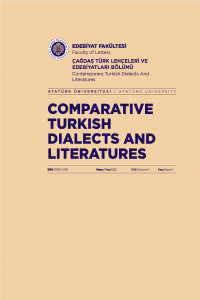LEKSİK OKASYONALİZMLER VE BENZER OLAYLARLA İLİŞKİSİ
Makalenin girişinde okasyonalizm ve neolojizm kavramlarının anlamları üzerinde durulmuştur. Önce bu kavramların sözlüklerde geçen anlamları verilmiştir. Sonra aynı kavramların dilbilimi kaynaklarında ne şekilde ele alındığı, benzer ve farklı yönleri üzerinde durulmuştur.Okasyonalizm, bir dilde var olan bir söze bir kimse tarafından yüklenen yeni anlamdır. Okasyonalizm hem bireyseldir hem de geçicidir. O yeni anlam başkaları tarafından kullanılmaz, dolayısıyla hiçbir zaman genelleşmez. Neolojizm, bir dilde peyda olan yeni sözcüktür. Bu yeni sözcük dilin kendi imkânlarıya doğmuş olabileceği gibi diğer dillerden de alın-mış olabilir. Neolojizmin en önemli hususiyeti, o dili kullanan insanlar tarafından yeniliğinin hissedilmesidir. Bir dilde her bir sözün neolojizm olarak kabul edildiği bir dönem vardır. Çünkü bugün yaygın olarak kul-landığımız her bir sözün doğduğu bir tarih vardır. Sözcük zaman içinde yaygınlaştıkça neolojizm olmaktan çıkar. Mesela, kolhoz, sovhoz, trak-tör, traktörcü, piyoner gibi sözcükler 1930’lu yıllarda Özbekçede neolo-jizm idiler. Kullanımları yaygınlaştıkça neolojizm olmaktan çıktı ve normal sözcüğe dönüştüler. Aynı şekilde vezir (bakan) vilayet, tümen (ilçe), hakim (vali), nafakahor (emekli) gibi bazı sözcükler de Özbekçede 1990’lı yılların neolojizmleridir. Bu sözcükler günümüzde yaygın bir şe-kilde kullanıldıkları için artık eskimiş ve normal sözcükler olarak kabul edilmektedirler.
Anahtar Kelimeler:
okasyonalizm, okasyonal sözcük, okkasional anlam, neolojizm, potansiyel anlam
LEXICAL OCCASIONALISMS AND ITS RELATION TO SIMILAR EVENTS
In the introduction of the article, the meanings of the concepts of okkazionalism and neologism are emphasized. First, the meanings of the-se concepts in dictionaries are given. Then, how the same concepts are handled in linguistics resources and their similar and different aspects are emphasized.Okkazionalism is the new meaning ascribed to a word that exists in a language. Occasionalism is both individual and temporary. That new meaning is not used by others, so it never becomes general.Neologism is a new word in a language. This new word may have arisen from the language's own possibilities, or it may have been taken from other languages. The most important feature of neologism is that its novelty is felt by the people who use that language. There is a period when every word in a language is considered neologism. Because every word that we commonly use today has a date when it was born. As the word becomes more widespread over time, it ceases to be neologism. For example, words such as kolkhoz, sovhoz, tractor, tractor driver, pioner were neologisms in Uzbek in the 1930s. As their use became more widespread, they ceased to be neologisms and became the regular word. Likewise, some words such as vizier (minister), province, tumen (dist-rict), judge (governor), nafakahor (retired) are also the neologisms of the 1990s in Uzbek. Since these words are widely used today, they are now considered obsolete and normal words.Terms that make up a certain part of the vocabulary of the Uzbek language are used as epithets in fiction, and they serve to emotionally exaggerate the characteristic features of certain things and events. In the paper, the epithet formation of scientific terms related to philology, mathematics and astronomy is analyzed, the epithet as a means of artistic image arises based on the internal possibility of the language material in the speech process.
Keywords:
occasionalism, occasional word, occasional meaning, neologism, potential meaning,
___
- Shteyntal G. Grammatika, logika i psixologiya.
- Zveginsev (1956) V. Xrestomatiya po istorii yazikoznaniya XIX-XX vekov. ch.1.M.
- Potebnya A. (1874) Iz zapisok po russkoy grammatike.- Voronej.
- Vinogradov V.V. (1947) Russkiy yazik. M. –L.: Uchpedgiz.
- Usmonov S. (1963) So‘z – til birligi va nutq birligi sifatida // Tilshunoslik masala-ri. Toshkent: O‘zSSR FA.
- Neʼmatov H., Bozorov (1992) O. Til va nutq. Toshkent: O‘qituvchi.
- Axmanova O.S. (1969) Slovar lingvisticheskix terminov. - M.: Sov. Ensiklopediya.
- Slovar inostrannix slov (1979) M.: Russkiy yazik.
- Rozental D.E., Telenkova M.A.(1976)Slovar – spravochnik lingvisticheskix ter-minov. - M.: Prosveщyeniye.
- Xojiyev A. (1985) Lingvistik terminlarning izohli lug‘ati. Toshkent: O‘qituvchi.
- O‘zbek tili leksikologiyasi (1981) Toshkent: Fan. Timofeyev K.A. (1971) Ob osnovnix ponyatiyax slovoobrazovaniya. Russkiy ya-zik v shkole.
- Likov A.G. (1976) Sovremennaya russkaya leksikologiya (russkoye okkazionalno-ye slovo). M.: Nauka.
- Başlangıç: 2022
- Yayıncı: Atatürk Üniversitesi
Sayıdaki Diğer Makaleler
EDEBÎ METİNLERDE BULUNAN SIFATLARIN TERİM OLARAK KULLANIMI
EDEBÎ METİNLERDE BULUNAN KURAL DIŞI KOMBİNASYONLARIN LİNGVOPOETİK ÖZELLİKLERİ
LEKSİK OKASYONALİZMLER VE BENZER OLAYLARLA İLİŞKİSİ
KAYNAK ESERİN ÜSLUBUNUN ÇEVİRİ ESERE YANSITILMASI SORUNU
KIRGIZİSTAN’DA YAPILAN DEDE KORKUT ÇALIŞMALARI
